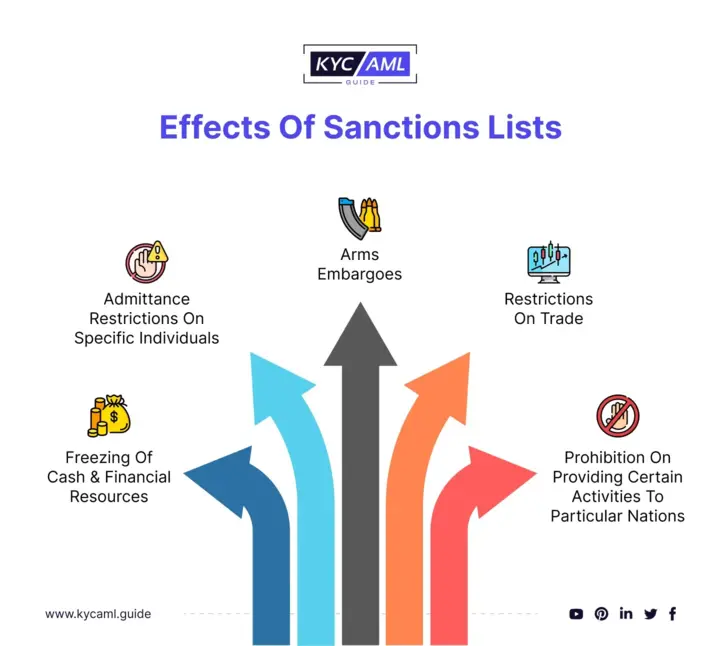Since Russia invaded Ukraine in 2022, sanctions have become a prominent topic. Superyachts being transported between Mediterranean ports by sanctioned Russian oligarchs made national headlines and captured the public’s interest. In total, 16 public enforcement actions totaling more than $42.7 million were carried out by OFAC in 2022. From $20.9 million in 2021, the amount of penalties it paid out in settlements nearly doubled.
Sanction Screening
The organization can reduce the risk of having money lenders or other criminals or individuals associated with crimes enter the ship by checking sanctions in KYC. The association with criminals exposes the business to damage to its reputation and administrative fines. The KYC procedure must be completed since it is a legal requirement whenever a customer contacts a company to open an account or request any other service, whether in person or online.
When a customer or visitor conducts an irregular transaction, makes a foreign bank transfer, when money laundering is suspected, or when there is doubt about the legitimacy of previously gathered customer data or information, the KYC sanction process is implemented. For this kind of customer, AML name screening, sanction list or sanction screening ought to be conducted.
Also Read: The Role of Sanctions in Due Diligence
What are the Sanctions Lists?
Sanctions lists are created to help fight financial crime by identifying individuals, organizations, and nations that engage in or are suspected of engaging in illicit activities. Organizations can lower the risk of doing business with sanctioned organizations by filtering consumers based on sanctions lists.
These sanctions lists are a compilation of various regulatory and enhanced due diligence lists from major sanctioning bodies around the world, including the Office of Foreign Assets Control (OFAC), United Nations sanctions, European Union sanctions, Her Majesty’s Treasury, and thousands of other regulatory and law enforcement organizations, such as Interpol.

What is PEP in KYC?
A politically exposed person (PEP) is someone who has held or played a prominent role in the public sector. Examples include government officials, presidents, judges, military commanders, and governors. This is a critical aspect of due diligence. The key guideline about PEP KYC is laid by Financial Action Task Force (FATF) Recommendation 12.
Due to their involvement in financial crimes such as money laundering, bribery, and corruption, all senior executives are regarded as high risk. Financial institutions and other businesses must use the PEP in the KYC process to prevent illicit actions. By analyzing the official PEP list, the system assesses whether a person is a PEP. As part of anti-money laundering and Know Your Customer (AML/KYC) efforts, the PEP screening identifies and conducts customer due diligence on anyone exposed to politics. The PEP check also known as PEP sanction screening is performed throughout the customer approval or business inspection process to establish whether a potential customer or customer already in the database is politically vulnerable.
PEP Requirements in India
According to PMLA-2023, PEPs (Politically Exposed Persons) in India are those who occupy significant public positions and are subject to stringent financial regulations. PEP lists like RiskPro are used by financial institutions to identify and monitor them to comply with SEBI-RBI standards to avoid money laundering.
PEP Requirements in the US
A PEP is someone who occupies a public trust senior post or someone close to him or her, such as family members, professional associates, or persons who transact on his or her behalf, in the United States.
PEP Requirements in the UK
However, in the United Kingdom, the word PEP refers only to those in senior government posts. Relatives and close associates (RCA) to PEP, on the other hand, are deemed high risk and require proper and improved screening. PEPs in the United Kingdom are facing increasing difficulties as some banks terminate accounts due to perceived concerns like Nigel Farage, prompting legislative amendments to boost transparency. Furthermore, the FCA is required by the Financial Services Markets Regulation 2023 to examine its guidelines on money laundering and terrorism financing for PEPs, including compliance checks by regulated businesses.
Also Read: Politically Exposed Person: How PEPs Use Banking for Money Laundering?
PEP Requirements in the EU AMLD
The EU’s Anti-Money Laundering Directives address the dangers connected with PEPs or individuals who occupy or are closely affiliated with public office. When dealing with PEPs, increased due diligence is usually required.
PEPs are defined differently around the world. While the EU has broadened its definition under the 4th Anti-Money Laundering Directive, the US has limited its definition to international PEPs. This disparity emphasizes the need for more coordinated regulatory collaboration.
Best Practices For PEP & Sanction Screening
1 Concentrate on High-Quality Data
When performing PEP in KYC and sanction in KYC, it is crucial to focus on high-quality data. Incorrect addresses and spelling variances caused by language barriers might make this job much more difficult, not to mention the necessity to authenticate the customer’s other identity. To guarantee that sanctions from all relevant agencies are identified, the data used to screen clients should be comprehensive and up-to-date, ideally combined in one place with other watchlist databases such as AML Watchlist, and Global Watchlist.
2 Perform a Risk-based Approach
The FATF advises using a risk-based approach to PEPs KYC. An internal risk assessment, for example, can assist in deciding what constitutes political exposure and what does not, based on an FI’s policy and risk appetite.
3 Perform Due Diligence Tests
When it comes to PEP and KYC sanctions due diligence, as well as their close relationships, there is an underlying uncertainty that may necessitate more due diligence. Monitoring adverse media or unsolicited news, for example, can help organizations better analyze the whole range of risks connected with PEP and sanction screening. Enhanced Due Diligence (EDD) measures are required for high-risk PEPs. EDD entails learning more about the PEP, the intended business relationship, and the source of assets and wealth. It may also entail more intense monitoring of the business relationship.
4 Conduct Ongoing Monitoring
Automate ongoing monitoring of individuals and businesses based on updated PEPs and sanctions lists to watch your clients daily and promptly alert you of changes in their situations or positions, guaranteeing ongoing compliance with AML requirements.
5 Make Use of Automation Tools.
Financial institutions can also use the KYC Guide solution directory designed to mitigate AML risks to increase the efficiency of the sanctions screening and PEP in KYC and automate much of the associated workload. To safeguard clients from sanctions and PEP databases, a single API-driven solution may collect information from numerous sources. Financial institutions can also reduce false positives and boost the efficiency of their screening processes by utilizing cutting-edge technologies such as artificial intelligence and machine learning.
6 Documentation and Record-keeping
Keep detailed records of all PEP and sanction screening activities. To demonstrate compliance with authorities and auditors, detailed records of screening results, client profiles, and due diligence efforts are essential.
Importance of PEPs and Sanctions in KYC
The significance of PEP in KYC and the sanctions screening is
- As a financial institution, they are required by law to follow AML and CTF standards. Failure to do so might result in serious penalties, such as significant fines and reputational harm.
- Identifying and avoiding contact with sanctioned individuals or PEPs lowers the risk of unintentionally assisting criminal activities, such as terrorist financing.
- The PEP check enables financial institutions to make more informed judgments by better understanding the financial history and actions of high-risk individuals.
- Maintaining a strong commitment to compliance and sound business practices improves the organization’s reputation and fosters confidence among customers and partners.
- Technology advancements have transformed the KYC landscape, making sanctions and PEP screening more efficient and accurate. Innovative artificial intelligence (AI) and machine learning (ML) technologies offer automated screening procedures, saving manual work and speeding up customer onboarding.
Also Read: Machine Learning and Effective AML Ongoing Monitoring
Conclusion
PEP and Sanction screening are critical components of the KYC process, allowing financial institutions to maintain and safeguard the financial system’s integrity. Institutions can keep ahead of developing dangers, safeguard their reputations, and contribute to a safer and more transparent financial ecosystem by implementing strong screening systems that monitor sanctions in KYC, and PEP in KYC, utilize technology, and foster collaboration.





